PCIe接口相對來講還是打交道比較多的接口。無論是Intel還是Xilinx的IP也都接觸到過。談及PCIe,就不可避免地涉及Bar空間。當然廠商的IP還是包裝的可以的,我們直接配置就行。但在使用時關于Bar空間的配置,往往牽涉到這么幾個概念:
IO/Mem
Prefetchable
32位/64位
早前這東西不假思索,抄抄之前的設計照著配置就好了。乍看pcieext-cocotb中的實現(xiàn),不禁思索,這些參數(shù)軟件是如何識別的呢?像下面EP常涉及的配置空間:
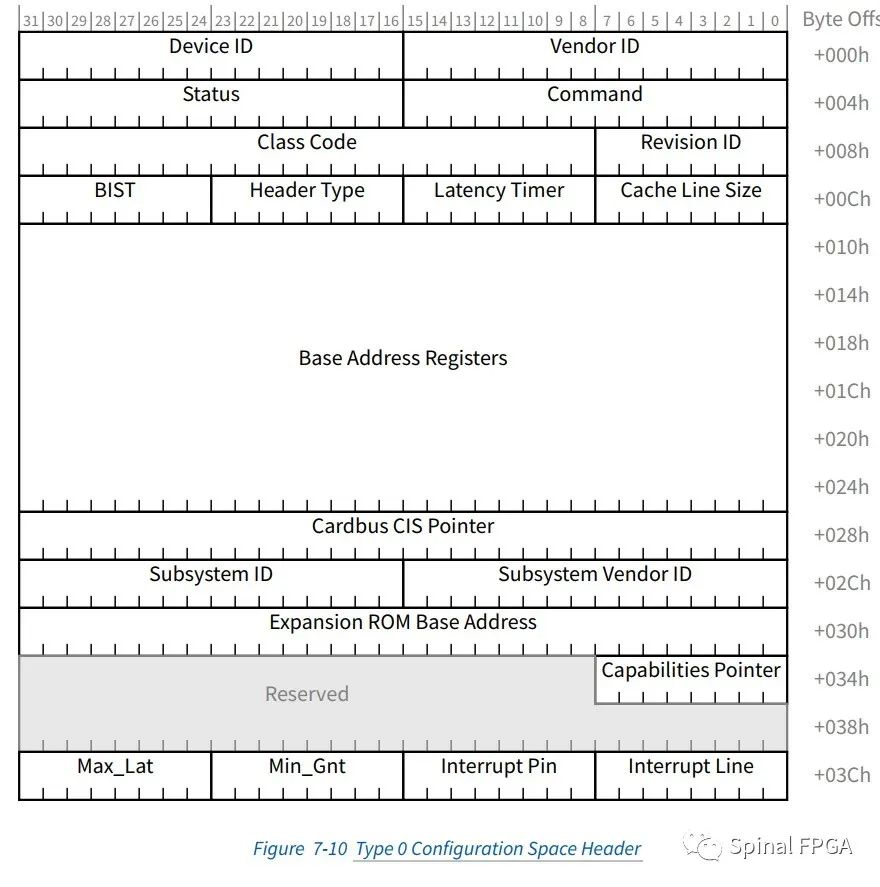
配置空間中所涉及到的只有6個Base Address Registers,似乎并無很明顯的指示~ 》協(xié)議解讀
先來看看Spec中關于Base Address Registers的定義:
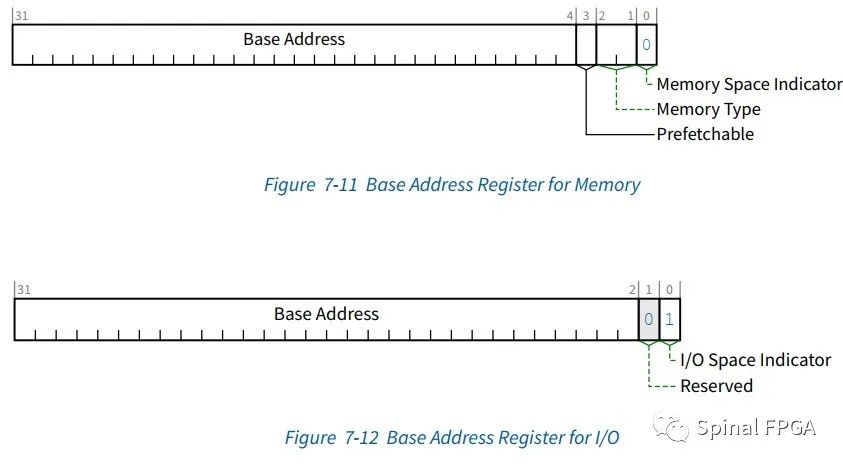
關于如何區(qū)分是Mem空間還是IO空間,Spec中定義了:
bit0:為1表示Memory Space,為0則表示I/O Space。
(I/O空間僅支持32位,且現(xiàn)在PCIe設備里也較少使用,這里不再展開,感興趣小伙伴可自行翻看Spec)
對于Memory類型空間,bit[3:0]均為只讀。在bit[2:1]中定義了Memory類型空間

可見,當bit[2]為1時表示64位地址空間,否則為32位地址空間。
而當bit[3]為1時,表示該Bar空間為Prefetchable,為0則不是非prefetchable。
看到這里,上面的疑問也基本可以解答了。在cocotbext-pcie中的配置方式也有所驗證:
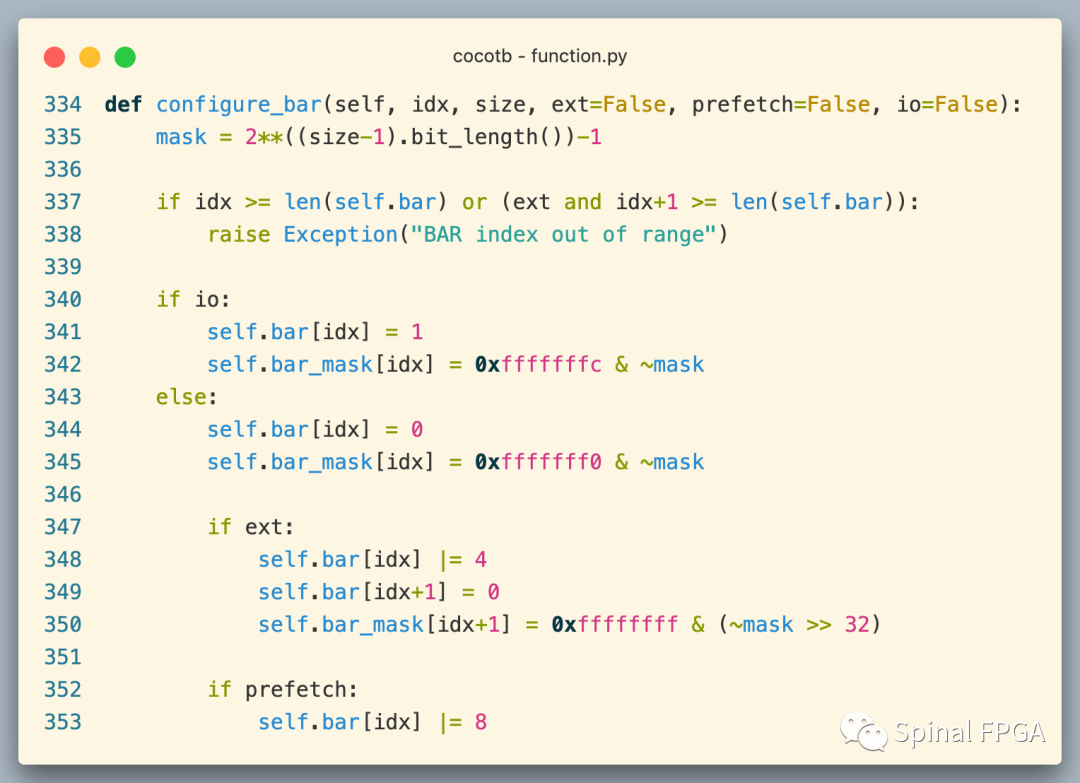
》Prefetchable
關于Prefetchable這個屬性,一直也沒有非常清晰的認識。按照Spec中的定義:
A Function is permittedto mark a range as prefetchable if there are no side effects on reads, the Function returns all bytes on reads regardless ofthe byte enables, and host bridges can merge processor writes into this rangewithout causing errors.
Any device that has a range that behaves like normal memory should mark the range as prefetchable. A linear frame buffer in a graphics device is an exampleof a range that should be marked prefetchable.
一般而言,在PCIe設備里,Bar空間基本用于實現(xiàn)寄存器讀寫,是基本符合上面所描述的情況的,所以配置成prefetchable還是有必要的。而且在spec中,也提到了: PCI Express adapters with Memory Space BARs that request a large amount of non-prefetchable Memory Space(e.g., over 64 MB) may cause shortages of that Space on certain scalable platforms, since many platforms supporta total of only 1 GB or less of non-prefetchable Memory Space.This may limit the number of such adapters that
can be supported on those platforms. For this reason, it is especially encouraged for BARs requesting largeamounts of Memory Space to have their Prefetchable bit Set, since prefetchable Memory Space is more bountifulon most scalable platforms.
On PCI Express systems that meet the criteria enumerated below, setting the Prefetchable bit in a candidate BARwill still permit correct operation even if the BAR’s range includes some locations that have read side-effects orcannot tolerate write merging. This is primarily due to the fact that PCI Express Memory Reads always contain an
explicit length, and PCI Express Switches never prefetch or do byte merging. Generally only 64-bit BARs are goodcandidates, since only Legacy Endpoints are permitted to set the Prefetchable bit in 32-bit BARs, and mostscalable platforms map all 32-bit Memory BARs into non-prefetchable Memory Space regardless of thePrefetchable bit value.
這里貼上Spec中的原話,總結起來:盡可能配置成64 bit prefetchable.
》Bar空間的初始化
對于Bar空間,其核心除了上述的屬性檢測外另一重點便是為Bar空間分配指定大小的地址空間。
對于Base Address Registers,Bar空間的大小只能配置成2的n次方。以32位Memory 空間為例,其可配置的范圍是16Byte~2GB(低四bit用于設置Bar空間屬性)。
對于指定大小所占用的位,其只讀并且始終為0,若沒有被使用,則其會返回全0。在初始化時軟件可以向Bar空間寫全1然后回讀。
對于讀會的數(shù)據(jù),將低4bit清零,然后所有bit取反后加1即為對應的Bar空間大小。分配好地址空間好將Base地址寫回到Base Address Registers中~
審核編輯:劉清
-
寄存器
+關注
關注
31文章
5317瀏覽量
120003 -
PCI
+關注
關注
4文章
662瀏覽量
130184 -
PCIe
+關注
關注
15文章
1217瀏覽量
82436 -
PCIe接口
+關注
關注
0文章
120瀏覽量
9675
原文標題:PCIe——Bar空間是怎么生效的
文章出處:【微信號:Spinal FPGA,微信公眾號:Spinal FPGA】歡迎添加關注!文章轉載請注明出處。
發(fā)布評論請先 登錄
相關推薦
6678通過pcie進行boot時,PC無法寫bar空間
求教:關于DM8168的PCIe寄存器
關于PCIE中BAR配置的問題。
關于C6678的PCIE中BAR配置問題
C6657 PCIE 問題咨詢
C6678,PCIe,BAR的地址范圍
如何通過BAR0和BAR1訪問(讀/寫)寄存器?
如何使用AXI-PCIe橋接IP與我的邏輯進行通信
關于PCI9054在BAR3空間讀取SDRAM數(shù)據(jù)地址需要*4的問題
如何解決PCIe采集卡在3588J開發(fā)板無法進行大容量高端BAR Memory空間分配的問題
IMX8 PCIE BAR 15沒有空間是怎么回事?
體驗紫光PCIE之使用WinDriver驅動紫光PCIE
PCIe—Bar空間是怎么生效的?
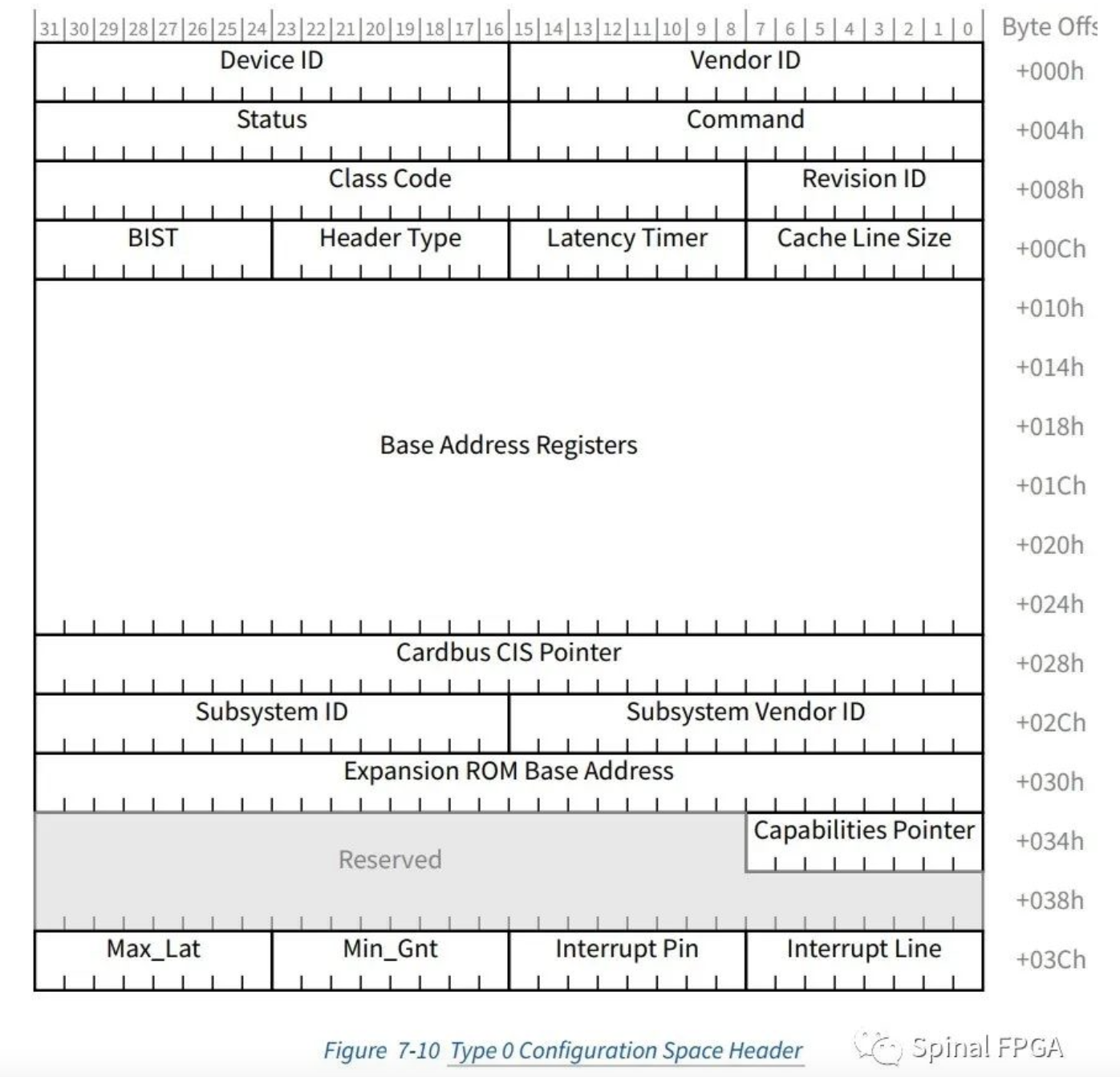
PCIe相關問題解答
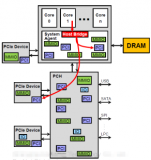




 PCIe—Bar空間是怎么生效的
PCIe—Bar空間是怎么生效的










評論